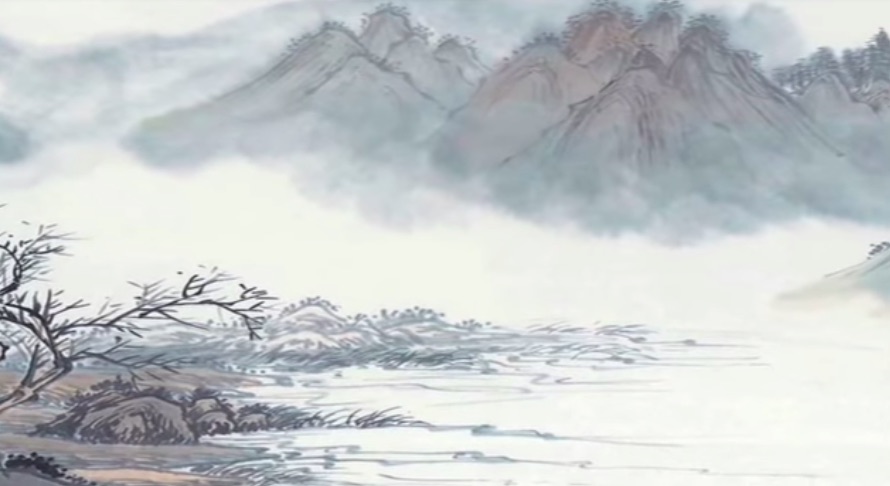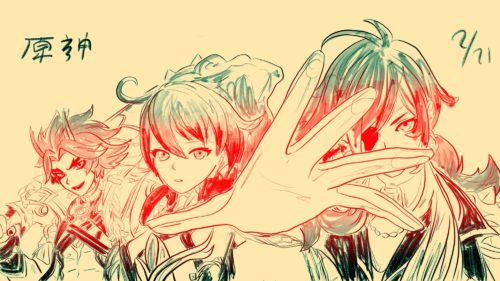Friday Song: The songs, dreams, and worlds inspired by Jin Yong

I kissed the wind and rain, and I buried the sun in the desert, but I never felt confused;
I walked across the mountains and seas, and I stamped on the snow, but I never fell in despair;
The sky is wide, and the snow is heavy, but who is to sail with me?
The sand waves wildly, the water wrinkles up,
the ripples smile and spread in rings,
Rest in a moment,
a moment immersed in love
— From “A Hard Scripture to Read” (难念的经 nán niàn de jīng), theme song of The Demi-Gods and Semi-Devils, broadcast on the Hong Kong channel TVB, 1997
The evening when news came out that Chinese wuxia writer Jin Yong 金庸 passed away, within minutes, my WeChat Moments timeline (like Facebook’s News Feed) was filled with posts in which people expressed sadness and shared their memories of reading him and watching films and TV shows adapted from his works. Those posts came from people of all ages, from college students to retirees. I don’t remember anyone else’s death eliciting such universal mourning on Chinese social media.
One can’t overstate how influential Jin Yong was in the Chinese diaspora. Wuxia (武侠), which literally means “martial heroes,” is a genre of Chinese literature about martial artists and heroes during ancient times. In several articles I’ve read this week, people have classified Jin Yong’s works as a “shared language” among ethnic Chinese people, in mainland China, Hong Kong, Taiwan, and overseas communities in Singapore, North America, etc.
When I was growing up, my friends and I would secret save our breakfast money to buy Jin Yong’s pirated novels in illegally run bookshops and hide them in the drawers to read during classes. We were by no means the only ones to do this. My aunt’s husband, who probably is the least literary man in our family, kept a series of The Legend of the Condor Heroes (射雕英雄传 shè diāo yīngxióng zhuàn) in a locked box, which was discovered years later when the family renovated the apartment. At eight years old, I daydreamed that I would one day be a female kung-fu master, flying over the schoolyard to impress my teachers and friends and leaving home to take my adventure in “Jianghu,” River and Lake, an underground world of wandering fighters created by wuxia writers.
Years later, I’ve forgotten the plots of the stories, but anytime I hear the music that once accompanied the TV shows and films, I can’t help but feel excited and nostalgic. The music gives me goosebumps, my blood burns, and my senses get sharper. Memories flood back of the days when I watched the stories unfold on TV, sitting in a small chair with my brother. In summer afternoons, cicadas cry, we hold ice creams in our hands, and our eyes are fixated on the legendary world of Jin Yong’s creation.
The first Jin Yong TV show I watched was The Return of the Condor Heroes (神雕侠侣 shén diāo xiá lǚ), but the first show imported by Chinese channels was probably the 1983 version of The Legend of the Condor Heroes — my uncle’s favorite — produced by Hong Kong’s Television Broadcasts Limited (TVB). Its theme song, Hot Blooded (铁血丹心 tiěxuè dānxīn), was so popular that many Chinese people of my parents’ age could hum it, as it was ubiquitous on mainland radios in the 1990s. The song makes people think of the sand, the desert, the nomad in North China, and the sun setting — a hero walking with his lover, disappearing in the sunset. The music works perfectly with the story.
Dream, love, hatred, desert, wind, snow, sun, eagle…these are the images in many other theme songs for Jin Yong’s works. In many of them, both male and female singers croon at the same time, capturing the romance in the stories. Jin Yong was good at writing not only the hero’s world but also romance. And in his works, women are imbued with character.
Another popular song is “A Sound of Laughter Across the Blue-Green Sea” (沧海一声笑 cānghǎi yīshēng xiào), which is my favorite (and embedded above), with lyrics by the lyricist James Wong (黃霑 Huáng Zhān). Wong has written more than 2,000 beautiful pop songs, and his works are full of poetic elements.
Here’s a translation of A Sound of Laughter Across the Blue-Green Sea:
The blue seas laugh,
surging against both shores;
We are carried by the waves,
we are only concerned with the here and now;
The azure skies laugh,
at the disorder in the world;
Only the heavens know,
who will win and who will lose;
The rivers and mountains laugh,
the clouds rain are far away;
After the billowing waves are spent,
how beautiful the vulgar world of mortals seems;
The clear breezes laugh,
and they provoke feelings of solitude;
Noble sentiments leave unmelancholic
like a long stretch of moonlight nights;
The green earth laughs, solitude is no more,
noble sentiments still make us laugh like we don’t care
It’s hard to imagine it happening again in modern China, when tens of millions of people turn on their TVs and truly enjoy the same show at the same time. Only in the pre-internet age, when entertainment products were limited, could it happen. This was also during the golden age of Hong Kong and Taiwan music, when composers and lyricists like James Wong grew up with a more profound understanding of traditional Chinese culture while also having a broader knowledge of the West than their mainland counterparts, who came of age during the Culture Revolution.
Mainland Chinese born in the 1980s and early 1990s loved Hong Kong and Taiwan pop culture. My brother used to buy empty cassettes and use a Sanyo recording machine to record the theme songs of shows like The Deer and the Cauldron (鹿鼎记 lùdǐngjì). I collected a whole pencil box of stickers of images of characters from Jin Yong’s wuxia films and TV series. All of my friends’ favorite films and idols were from the two places. We thought they were “real stars.” The songs, films, TV shows, singers, and artists behind the screen all made me wonder what the world is like across the border.
But we didn’t understand Cantonese. My brother used pinyin to mark the pronunciation of Cantonese to help him sing the songs every evening, following the recording machine. I asked him to explain the lyrics to me. He frowned his eyebrow and told me something that didn’t make sense. Many years later I understood how different Cantonese was from Mandarin, and even though you could read all the characters, you still couldn’t get the meaning. I asked my brother if he just made up the meanings to please me.
“But does it matter?” he laughed.
No, I guess it didn’t, just like it didn’t matter if some plots in Jin Yong’s stories didn’t make sense, using the logic of our real world. Those stories and songs created a fantasy world for my generation, and the values in those stories became an important part of our worldview, before we even realized it.
Friday Song is SupChina’s weekly sign-off. Let us know what you thought of the week that was in the comments below, or email editors@thechinaproject.com.





